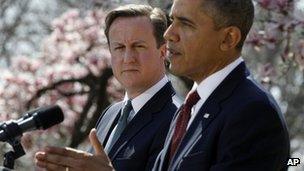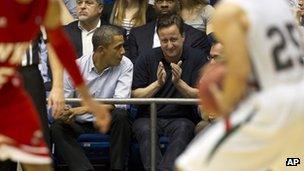Cameron and Obama stick to Afghan script
- Published
- comments

The two leaders were in lock-step in their comments on Afghanistan
The Fife and Drum Corps were magnificent in their red uniforms, the 5,000 cheering children on the White House lawn were sweet, and the jokes about the British burning down the White House in 1814 were a nice historical counterpoint to all the talk of an essential relationship.
The state dinner sounds delicious, with President Obama offering his guests crisped halibut, bison Wellington and lemon pudding with Idaho Huckleberry sauce.
By contrast the joint news conference between Prime Minister David Cameron and President Barack Obama was a bit bland. There was not much headline news generated.
No doubt that was exactly how they wanted it. No shocks, no disagreements on display.
So you have to go beyond their words to find out what is going on.
No Afghanistan surprise
On Afghanistan, the British wanted to make sure that they don't go home and switch on the TV one day to find President Obama pulling an election stunt, announcing the troops are all coming home next year.
So Mr Obama made it clear the next moves would be decided at the upcoming Nato summit, to be held in Chicago in May, "shifting to a support role next year, in 2013, in advance of Afghans taking full responsibility".
The prime minister agreed. "In 2013, this includes shifting to a support role as Afghans take the lead. This is an advance of Afghan forces taking full responsibility for security in 2014."
Notice how many times the two men mentioned the Lisbon Nato summit, held in November 2010. That was when an end date of 2014 was agreed. So this all translates as "no more nasty surprises".
When US Defence Secretary Leon Panetta first talked last month of a handover next year, jaws dropped in Whitehall. The Brits do not want to be left holding the Afghan baby all alone.
So the president was even more explicit later on: "In terms of pace, I don't anticipate, at this stage, that we're going to be making any sudden additional changes to the plan that we currently have. We have already taken out 10,000 of our troops. We're slated to draw down an additional 23,000 by this summer."
The White House has reassured the Brits that there will be no election year surprises.
'Kick the tyres'
On Iran there is complete agreement. They're talking tough.
The president says "the window for solving this issue diplomatically is shrinking". The prime minister says "the president and I have said nothing is off the table. That is essential for the safety of the region and the wider world".
But they are both equally horrified at the thought that Israel could take military action this year.
The British government thinks that even if such an attack went as well as possible, with little retaliation by Iran, oil prices would spike, destroying the world economy and Mr Obama's chance of re-election.
They're hoping Mr Obama has waved a very big diplomatic stick in Bibi Netanyahu's general direction.
On Syria the difference is of sentiment, and enthusiasm, rather than policy. President Obama revealed that the US military had looked at how to carry out a Libyan-style operation. "Our military plans for everything. That's part of what they do."
David Cameron's team feel they have a mission, to help create a better, freer and more democratic world. His seem to feel keen frustration that it is so hard.

Offering a basketball lesson - and a photo op
"Of course, our teams, all the time, as I put it, kick the tyres, push the system, ask the difficult questions - what are the other options, what are the other things that we could do? And it's right that we do that. But they're not without their difficulties and complications, as everybody knows."
The two men are agreed that the best solution is for Syria's Bashar al-Assad to step aside, not for a revolution from below. But the president seems wary of making a new world through force.
"I was very clear during the Libya situation that this was unique… when we see what's happening on television, our natural instinct is to act. One of the things that I think both of us have learned in every one of these crises - including in Libya - is that it's very important for us to make sure that we have thought through all of our actions before we take those steps."
I'm told that their personal relationship is really close, especially after five hours spent face-to-face while flying out to that basketball game on Tuesday evening.
The Obama team find David Cameron amazingly relaxed and are grateful to him for showing leadership over Libya and Syria.
It is not too fanciful to imagine that Obama sees his relationship with Cameron as a mirror image of Bush-Blair: rather than allowing America to go it almost alone, it helps the US build coalitions and lead from behind.
- Published5 January 2012
- Published13 March 2012
- Published14 March 2012